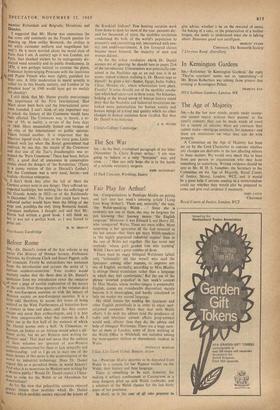Before Rome
SIR,—Dr. Daniel's review of the first volume in my series The History of Human Society, Prehistoric Societies, by Grahame Clark and Stuart Piggott, calls for comment. Firstly he extrapolates two sentences from the introduction and accuses the series of 'a curious occidentrocentrism.' Your readers would Scarcely realise that the three dots in Dr. Daniel's quotation from my introduction cover the omission "„,of over a page of careful explanation of the nature of the series. Over three-quarters of the volumes deal with non-European societies or with the impact of Western society on non-European societies. It is a little odd, therefore, to accuse this series of being it centred on the West. Furthermore all historians have a context in time and place, and this they cannot escape any more than archaeologists, and it is best to state unequivocably what that context is. As I Point out in the first half of the sentence of which. Dr. Daniel quotes only a half, 'A Chinaman, or Russian. an Indians or an African would select a dif- ferent series; but we are Western men writing for Western man.' That does not mean that the authors of these volumes are ignorant' of non-Western societies, unconcerned for them of lack sympathy and understanding: and as I go on to state one of the Main themes of this series is the westernisation of the World by industrial technology. Does Dr. Daniel regard this as a parochial theme in world history? And what is so monstrous in Western men writing for a Western public? Would Dr. Daniel expect a China- man to write for the Welsh or an Abyssinian for Amerindians? .
As for the view that palacolthic societies enjoyed greater leisure than neolithic which Dr. Daniel mocks, which neolithic society enjoyed the leisure of the Kwakiutl Indians? Few hunting societies work from dawn to dusk for most of the year. peasants do: and for thousands of years, the neolithic revolution condemned the bulk of the world's population to peasantry and unremitting toil, interspersed with pen- ury and undernourishment. A few favoured classes became more leisured, the majority of men and women did not.
As for the urban revolution which Dr. Daniel accuses me of ignoring. he should turn to pages 23-4 of the introduction. Urbanisation was potentially con- tained in the Neolithic age as an oak tree is in an acorn; indeed without realising it, Dr. Daniel says so himself : he gives a list—Sumer, Egypt, Indus Valley, China, Mexico, etc., where urbanisation took place. Exactly! It arose directly out of the neolithic revolu- tion which had taken root in these areas. No historian, looking at the broad sweep of human history could deny that the Neolithic and Industrial revolutions un- locked more potentialities for human society and human beings of a kind and quality which no other changes in human existence have rivalled. But then Dr. Daniel is no historian.
Christ's College, Cambridge
J. H. PLUMB














































 Previous page
Previous page